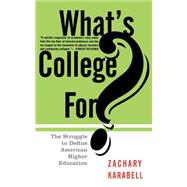
Note: Supplemental materials are not guaranteed with Rental or Used book purchases.
Purchase Benefits
| Introduction | p. vii |
| The Students | p. 1 |
| The Classroom | p. 23 |
| Graduate Students | p. 47 |
| The Professors | p. 81 |
| Tenure | p. 109 |
| Professors and Society | p. 141 |
| History Standards | p. 163 |
| Adjuncts and Community Colleges | p. 191 |
| Society and Higher Education | p. 213 |
| Conclusion | p. 231 |
| Notes | p. 247 |
| Acknowledgments | p. 271 |
| Index | p. 273 |
| Table of Contents provided by Publisher. All Rights Reserved. |
The New copy of this book will include any supplemental materials advertised. Please check the title of the book to determine if it should include any access cards, study guides, lab manuals, CDs, etc.
The Used, Rental and eBook copies of this book are not guaranteed to include any supplemental materials. Typically, only the book itself is included. This is true even if the title states it includes any access cards, study guides, lab manuals, CDs, etc.